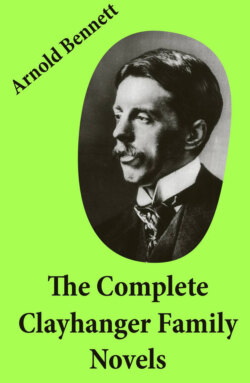Читать книгу The Complete Clayhanger Family Novels (Clayhanger + Hilda Lessways + These Twain + The Roll Call) - Arnold Bennett - Страница 95
На сайте Литреса книга снята с продажи.
Seven.
ОглавлениеDuring tea he felt himself absurdly self-conscious, but nobody seemed to notice his condition. The whole family went to chapel. The letter lay in his pocket, and he might easily have slipped away to the post-office with it, but he had had no opportunity to possess himself of a stamp. There was no need to send the letter through the post. He might get up early and put it among the morning’s letters. He had decided, however, that it must arrive formally by the postman, and he would not alter his decision. Hence, after chapel, he took a match, and, creeping into the shop, procured a crimson stamp from his father’s desk. Then he went forth, by the back way, alone into the streets. The adventure was not so hazardous as it seemed and as it felt. Darius was incurious by nature, though he had brief fevers of curiosity. Thus the life of the children was a demoralising mixture of rigid discipline and freedom. They were permitted nothing, but, as the years passed, they might take nearly anything. There was small chance of Darius discovering his son’s excursion.
In crossing the road from chapel Edwin had opined to his father that the frost was breaking. He was now sure of it. The mud, no longer brittle, yielded to pressure, and there was a trace of dampness in the interstices of the pavement bricks. A thin raw mist was visible in huge spheres round the street lamps. The sky was dark. The few people whom he encountered seemed to be out upon mysterious errands, seemed to emerge strangely from one gloom and strangely to vanish into another. In the blind, black facades of the streets the public-houses blazed invitingly with gas; they alone were alive in the weekly death of the town; and they gleamed everywhere, at every corner; the town appeared to consist chiefly of public-houses. He dropped the letter into the box in the market-place; he heard it fall. His heart beat. The deed was now irrevocable. He wondered what Monday held for him. The quiescent melancholy of the town invaded his spirit, and mingled with his own remorseful sorrow for the unstrenuous past, and his apprehensive solicitude about the future. It was not unpleasant, this brooding sadness, half-despondency and half-hope. A man and a woman, arm-inarm, went by him as he stood unconscious of his conspicuousness under the gas-lamp that lit the post-office. They laughed the smothered laugh of intimacy to see a tall boy standing alone there, with no overcoat, gazing at naught. Edwin turned to go home. It occurred to him that nearly all the people he met were couples, arm-inarm. And he suddenly thought of Florence, the clog-dancer. He had scarcely thought of her for months. The complexity of the interests of life, and the interweaving of its moods, fatigued his mind into an agreeably grave vacuity.
